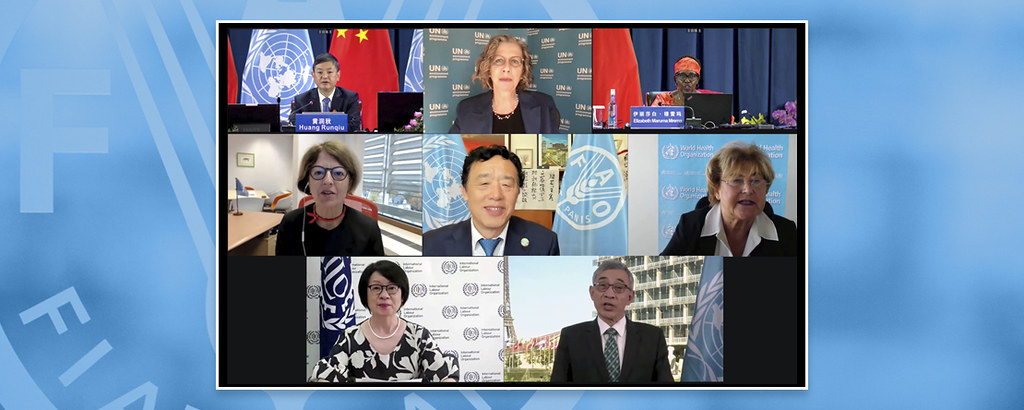Kunming COP15: Agri-food system transformation is key for biodiversity conservation
FAO Director-General speaks at Convention on Biological Diversity on building an ecological civilization

FAO Director General QU Dongyu at Virtual High-Level Segment (HLS) of the 2020 UN Biodiversity Conference “Ecological Civilization-Building a Shared Future for All Life on Earth”
©FAO
Rome – Reversing biodiversity loss, reducing greenhouse gas emissions, enhancing adaptation, strengthening resilience and improving productivity are essential to address poverty and hunger, QU Dongyu, Director-General of the Food and Agricultural Organization of the United Nations (FAO), said at a high-level panel discussion on Tuesday.
“In order to fulfil our shared aspiration of building a shared future for life on earth, we need to pursue the harmonious coexistence between humans and nature,” the Director-General said at the opening session of the 15th Meeting of the Conference of the Parties (COP15) to the Convention on Biological Diversity (CBD).
“COP 15 is an important milestone on the path,” Qu added in the segment, titled “Ecological Civilization – Building a Shared Future for All Life on Earth”.
COP15, convened in person and virtually in Kunming, China, aims to produce a global framework for biodiversity conservation for the next decade.
Qu spoke on a panel along with other senior U.N. officials. Earlier in the proceedings, President Xi XInping of China announced an ambitious plan of natural parks and protected areas as well as a ¥1.5 billion ($230 million) Kunming Biodiversity Fund to help implement a new framework for protecting nature this decade, calling on other countries to contribute.
Resource mobilization is a key theme for delegates. “Words, even targets, are not enough,” said CBD Executive Secretary Elizabeth Maruma Mrema.
FAO’s Director-General noted that the concept of “ecological civilization” aspires to achieve environmental, economic and social sustainable development and to enable the transformation of the world’s agri-food systems. Restoration of degraded ecosystems, he added – citing agroforestry practices as an example - can help “achieve multiple sustainable development objectives, including climate mitigation and adaptation, enhanced food security, and local economic development.”
Transforming agri-food systems should be a priority action area, and is at the heart of FAO’s Strategic Framework 2022-2031 to address current challenges, such as food insecurity, natural disasters and rural inequalities, Qu said.
The next steps
The COP15 will produce conclusions early next year, and FAO will be “ready and engaged to support implementation efforts alongside our Members and partners,” the Director-General said.
FAO’s aim, using four accelerators – technology, innovation, data and improved governance, human capital and institutions - to help Members “produce more with less” he emphasized. “We want more efficient, inclusive, resilient and sustainable agri-food systems for all,” he added.
In July 2021, FAO and the CBD Secretariat co-hosted a Global Dialogue on the Role of Food and Agriculture in the Post-2020 Global Biodiversity Framework, bringing together ministers, scientists, family farmers, the private sector and civil society to identify and explore solutions to scale up biodiversity-friendly practices across the agricultural sectors, including through enabling policies and markets.
Contact
FAO News and Media (+39) 06 570 53625 [email protected]
